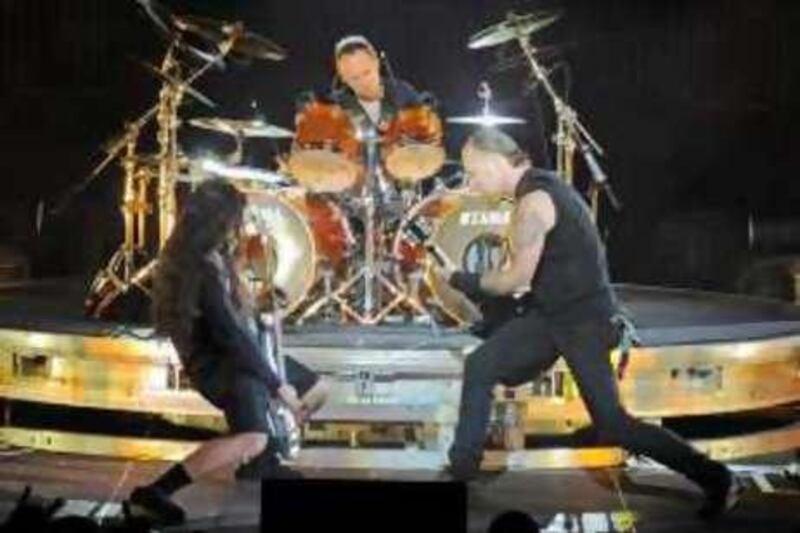The ninth album by San Franciscan thrash metal stalwarts Metallica already occupies a unique place in their recorded canon. Death Magnetic is the first outpouring from a group which was, in a nihilistic fashion, at war on its last record. That insurgency, surprising as it was since it occurred in the ranks of heavy metal's most stable institution, was captured in the behind-the-scenes documentary Some Kind of Monster, but more about that later. The rejuvenated sounds in Death Magnetic also mark the beginning of the group's mid-period career. Heavy metal, it insists, needn't burn out nor fade away.
Some Kind of Monster, released in 2004, revealed a group in turmoil. Once widely respected heavy metal underdogs, all four musicians had turned into bloated and bickering shareholders in Metallica, Inc., railing against the ills of music piracy and seeking refuge in the advice of a lifestyle consultant. The documentary ? its numerous highlights include a scene where the group's members collide with their indignant lead guitarist when they inform him of their decision to drop guitar solos from their upcoming album (which is akin to asking Van Gogh to use crayons instead of oils) ? provides a well of evidence to back up the notion that all rock stars are really just divas without sequined dresses and Chihuahuas.
In particular, singer James Hetfield's incessant scowling and fits of rage evoked an image of a hairy Mariah Carey. Perhaps unsurprisingly, Metallica's subsequent album, St Anger, saw the band sailing rudderless in choppy post-therapy waters. The group had decided to strip its bombastic approach down to a bare skeleton. Guitar solos were wiped; their drummer Lars Ulrich was given a kit which sounded as if he was beating on metal railings; and Hetfield's lyrics were an outpouring of raw self analysis: "My lifestyle equals my deathstyle".
In a genre of music where sentiment, and not lyrics, are the raison d'être, Hetfield's anguished self-flagellation sounded like childish petulance. The group's music, once taut and lean, also suffered as the songs sank in a shapeless sludge of dense power chords. Death Magnetic sees the group enlist the thoughtful talents of Rick Rubin, their first new producer since Bob Rock assumed duties on The Black Album in 1991. Rubin, a modern day musical svengali who rarely leaves his beloved Los Angeles has, over the last twenty years, successfully curtailed career slumps for artists as diverse as the late Johnny Cash, Neil Diamond, Tom Petty and Danzig. His methodology for those artists has been alarmingly simple: commanding them to strip their songs down to a basic verse-chorus-verse structure, then polishing the words until they gleam like platinum records mounted on a wall. His approach to Metallica's latest album is overwhelmingly patriarchal. The group's songs now retain their fluid guitar solos; Lars Ulrich has put away his Toys R Us-sponsored drum kit; and Hetfield spits and snarls in a cadence which has eluded him since 1986's breakthrough Master of Puppets album.
While the nine songs (and one instrumental) on Death Magnetic see Metallica revisit the speed metal of their late Eighties incarnation, Rubin's involvement also ushers in some distinct improvements. Where once Metallica were non apologists for simple three-chord thrash metal with Satanic themes (to an army of acned teenagers like myself, The Black Album was the perfect audio companion to Catcher in the Rye), the group's new music is both muscular yet sinewy. Songs like The End of the Line and Broke, Beat & Scarred are built on a marathon of demanding chord changes and drum progressions.
If Hetfield sounds out of breath on The Judas Kiss as he sings "When the storm has blackened your sky/ Intuition crucify", spare a thought for poor Ulrich, who must quake with fear when contemplating playing the song in concert every night on their upcoming world tour. This might be mid-period Metallica, a little heavier around the waist and slightly greying at the temple, but the group submits to Rubin's boot-camp treatment with relish.
What graduates is a more robust entity, newly trimmed of its multi-platinum torpor and no longer plagued by self doubt: in a fashion, the marathon men of thrash.
bwazir@thenational.ae





